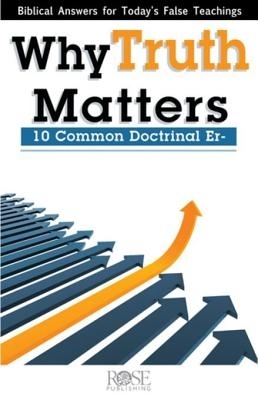
Why Truth Matters
R 68.94
Description
Learn to recognize the counterfeits through the light of God’s truth.
Christians often wonder why certain religious groups are called cults or are said to have cultic teachings. The answer is fairly simple. The Scripture mentions 10 key Christian beliefs that cult leaders or aberrant teachers ignore or twist. In Why Truth Matters you will learn each of these 10 beliefs and be able to give examples of truth vs. counterfeit teachings.
What is truth, and how can we know? The Bible plainly reveals the errors and false teachings that Christians will be expected to identify and defend against.
The 10 Common Doctrinal Errors include False Gospels, False Doctrine, False Gods, False Christs, False Spirits, False Prophets, False Apostles, False Teachers, False Visions, and False Miracles. Study questions are included for personal or group use. For example:
- Read panels 1-2. Have you talked with someone who used biblical words such as Jesus, salvation, or faith, but they seemed to mean something else? According to Scripture, what did Jesus’ death accomplish? On panel 2, three different examples are given of false gospels. How do these false gospels try make Jesus’ death less important?
- Read #2 False Doctrines. What does the Bible say about itself and the reliability of its doctrines? What common ways do cultic groups try to introduce their own teachings into Scripture?
Read #3 False Gods. God is not a force field or an idea of goodness. The Bible is clear who God is—and that he exists as the Trinity. How does this contrast with the false gods mentioned in this section?
BONUS: Includes a list of reliable ministries with up-to-date information so that you can look up specific cult groups and new religious movements.
Learn to recognize the counterfeits through the light of God’s truth.
Christians often wonder why certain religious groups are called cults or are said to have cultic teachings. The answer is fairly simple. The Scripture mentions 10 key Christian beliefs that cult leaders or aberrant teachers ignore or twist. In Why Truth Matters you will learn each of these 10 beliefs and be able to give examples of truth vs. counterfeit teachings.
What is truth, and how can we know? The Bible plainly reveals the errors and false teachings that Christians will be expected to identify and defend against.
The 10 Common Doctrinal Errors include False Gospels, False Doctrine, False Gods, False Christs, False Spirits, False Prophets, False Apostles, False Teachers, False Visions, and False Miracles. Study questions are included for personal or group use. For example:
- Read panels 1-2. Have you talked with someone who used biblical words such as Jesus, salvation, or faith, but they seemed to mean something else? According to Scripture, what did Jesus’ death accomplish? On panel 2, three different examples are given of false gospels. How do these false gospels try make Jesus’ death less important?
- Read #2 False Doctrines. What does the Bible say about itself and the reliability of its doctrines? What common ways do cultic groups try to introduce their own teachings into Scripture?
Read #3 False Gods. God is not a force field or an idea of goodness. The Bible is clear who God is—and that he exists as the Trinity. How does this contrast with the false gods mentioned in this section?
BONUS: Includes a list of reliable ministries with up-to-date information so that you can look up specific cult groups and new religious movements.
Instant Downloads
Access content immediately after purchase in the appSync to 6 Devices
Download your content to 6 devices including smartphones and tabletsNeed support?
Customer reviews
Download the App
Download the Christian360 App to read eBooks and listen to Audiobooks bought at Christian360
Download the App
Download the Christian360 App to read eBooks and listen to Audiobooks bought at Christian360
